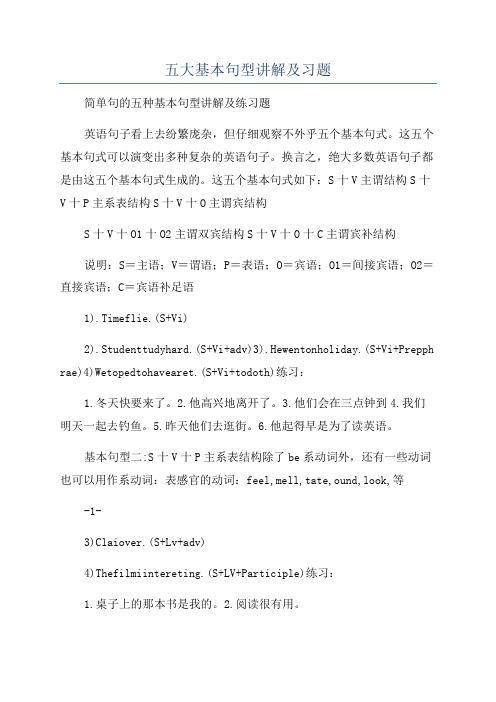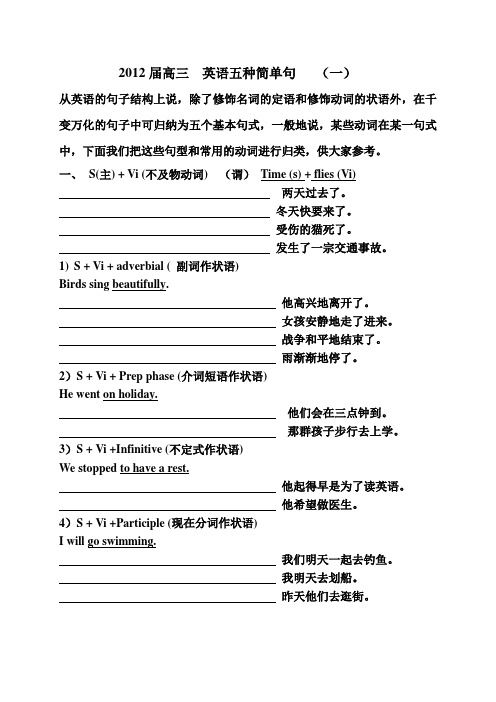1.1英语简单句五种基本句型SVO讲解、练习测试、打印版——学生用.docx
英语简单句的五种基本句型

英语简单句的五种基本句型第一篇:英语简单句的五种基本句型英语简单句的五种基本句型1、S+V+(状语)主谓(不及物动词)2、S+V+O主谓宾3、S+V+C /SVP主系表4、S+V+O+O主谓+双宾语5、S+V+O+C主谓+复合宾语S+V+PS+V+OS+V+IO +DOS+V +O +OC第二篇:英语简单句五种基本句型详解基本句型英语句子成分的排列顺序与汉语不同。
汉语放在前面的,英语可能要放在后面;而汉语放后面的,英语可能放在前面。
即使是同样一句话,如果用词不同,句中的次序也会有变化。
比如,“我每天骑自行车上学”,可以表达为 I go to school by bike every day.也可以表达为I ride to school every day.如果用图表分析一下,我们会看得更清楚:这三个语句除了行为者“I”的位置没有变化外,其它都发生了变化,并且由于“上学”表达方式的不同,在句中的位置也发生了变化。
句子成分详解一览表及巧记口诀句子成分学记口诀主语谓语是基础,宾表定状补辅助。
宾主来自名代数,动词作谓不可无。
简单句的五种基本句型英语是一种结构型的语言,以谓语动词为核心构成各种句型。
为了帮助你掌握英语的句型,本节课我们一起来总结一下英语的基本句型。
4.主语 + 及物动词 + 间接宾语 + 直接宾语(+ 状语)5.主语 + 及物动词 + 宾语 + 宾语补足语(+ 状语)第三篇:简单句基本句型英语句子的类型一.简单句的基本句型及造句1.主语+系动词+表语。
2.主语+不及物动词(主谓)。
3.主语+及物动词+宾语。
4.主语+及物动词+间宾+直宾。
5.主语+及物动词+宾语+宾补。
例句:I am happy.He is a student.She looks tired.I work.He is standing.You are sitting.I study English.I cook dinner.He is having lunch.He teaches us English.We call him Da Mao.He bought me a card.We should keep our classroom clean.He asks me to study hard.He helps me carry water.第四篇:简单句的五种基本句型及句型成分练习简单句的五种基本句型1.S十V主谓结构2.S十V十P主系表结构3.S十V十O主谓宾结构4.S十V十O1十O2 主谓双宾结构5.S十V十O十C 主谓宾补结构判断类型和句子成分:She came.She likes English.She is happy.The teacher asked me to read the passage.She bought a book for me.She gave John a book.My head aches.She makes her mother angry.The sun was shining.The moon rose.The dinner smells good.Everything looks different.He is growing tall and strong.His face turned red.Who knows the answer?He enjoys reading.I want to have a cup of tea.。
解读英语简单句的五种基本句型

解读英语简单句的五种基本句型五种简单句基本句型:1.“主语 + 谓语”(即“主谓”句型)这一句型英汉语言结构形式完全相同,说明“某人或某物如何动作”,或者说“某人或某物自身怎样运动”。
例:They arrived in Harbin yesterday morning.分析:“they”(主语)“arrived”(谓语)。
2.“主语 + 谓语 + 宾语”(即“主谓宾”句型)这一句型英汉语言的结构形式完全相同,用以说明“某人或某物做什么事情”,或者说“某人或某物发出了动作,并且其动作涉及到另一个人或物”。
例:I study English.分析:“I”(主语)“study”(谓语动作)“English”(宾语即动作涉及的对象)。
3.“主语 + 谓语 + 间接宾语 + 直接宾语”(即“主谓双宾”句型)这一句型英汉语序结构相同,说明“某人为谁(间接宾语为人)做某事”,或者说“某人或物的运动涉及到两个对象,其中一个间接对象为人,另一个为物”。
例:Our teacher taught us English.分析:“our teacher”(主语)“教”(谓语动作)“us”(间接宾语)“English”(直接宾语)。
4.“主语 + 谓语 + 宾语 + 宾语补足语”(即“主谓宾宾补”句型)这一句型说明“某人或某物要求(使、让)某人做什么”或“某人感觉某人或物怎么样”。
例:He asked her to go there.分析:“he”(主语)“asked”(谓语动作)“her”(宾语即动作涉及的对象)“to go there”(补语—补充说明宾语做什么)。
5.“主语 + 系动词+ 表语”(即“主系表”句型)这一句型用以说明“某人(某物、某事、某种概念)具有什么特征或处于什么状态”。
汉语的“是”字结构属于这一英语句型的形式之一。
常用的联系动词有be, keep, lie, remain, stand, become, fall, get, go, grow, turn, look, feel, seem, smell, sound, taste, 等。
英语五大基本句型详解及练习(配答案)

从英语的句子结构上说,除了修饰名词的定语和修饰动词的状语外,在千变万化的句子中可归纳为五个基本句式,一般地说,某些动词在某一句式中,下面我们把这些句型和常用的动词进行归类,供大家参考。
一、S(主) + Vi (不及物动词) (谓)Time (s) + flies (Vi)两天过去了。
冬天快要来了。
受伤的猫死了。
发生了一宗交通事故。
1)S + Vi + adverbial ( 副词作状语)Birds sing beautifully.他高兴地离开了。
女孩安静地走了进来。
战争和平地结束了。
雨渐渐地停了。
2)S + Vi + Prep phase (介词短语作状语)He went on holiday.他们会在三点钟到。
那群孩子步行去上学。
3)S + Vi +Infinitive (不定式作状语)We stopped to have a rest.他起得早是为了读英语。
他希望做医生。
4)S + Vi +Participle (现在分词作状语)I will go swimming.我们明天一起去钓鱼。
我明天去划船。
昨天他们去逛街。
S(主)+ Vt( 及物动词) (谓)+ Object (宾)------- We like English.1)S + Vt + N/ Pron (名词或代词作宾语)I like music. / I like her.他去年教数学。
我们已收到了他们的来信。
2)S + Vt + Infinitive (不定式作宾语)I want to help him.他爸爸期待拥有一家工厂。
他们假装在看书。
我尝试去解决那个问题。
常用于这个句型的动词有:attempt ,dare ,decide, desire, expect, hope, wish, intend, learn, need, offer, pretend, promise, propose, refuse, want, manage, plan, fail, try, agree等。
简单句的五种基本结构讲与练

三、句型3:SP: Subject (主语) + Link. V(系动词) + Predicate(表语)
这种句型主要用来表示主语的特点、身份等。其系动词一 般可分为以下三类:
1.渐变类系动词:become, come, fall, get, go, grow, turn 2.感官系动词:feel(感到,摸起来), look(看起来), taste (尝起来), sound(听起来), smell(闻起来) 3.保持类系动词:keep(保持), remain(依然(短语)等来充当。如: He’s a chemist. 他是个化学家。
3.从句作宾语 I don't know what I should do next. 我不知道接下 来做什么。
练习二、把下面句子译成英语。
1. 我计划在即将到来的五一节去旅游。 2. 他给朋友写了一些信。 3. 这个博物馆很值得参观。 4. 我永远忘不了参观长城这件事。 5. 离开之前不要忘了关灯。 6. 我希望你能为我提一些宝贵建议。
简单句的五种基本结构讲与练
简单句是由一个主语(或并列主语)和一个谓语 (或并列谓语)构成的句子。简单句的谓语部分包 括谓语动词及宾语、宾语补足语、表语等不同句子 成分,不同谓语动词的不同组合形成简单句的基本 句型。
一、句型1:SV:Subject (主语) + Vi (谓语) 这种句型中的动词是不及物动词,不能直接带宾 语。常见的不及物动词有:agree, arrive, burn,
He handed me a cup of tea.
如果把直接宾语放在间接宾语之前,间接宾语前要加to或 for。
1.加to的主要动词有:give, hand, pass, lend, pay, read, sell, send, show, teach, tell, post,bring, take, leave, return write, throw, promise, refuse, allow, offer, pay等。
英语五大基本句型详解及练习(配答案)

2021届高三英语五种简单句〔一〕从英语的句子结构上说,除了修饰名词的定语和修饰动词的状语外,在千变万化的句子中可归纳为五个根本句式,一般地说,某些动词在某一句式中,下面我们把这些句型和常用的动词进行归类,供大家参考。
一、S(主) + Vi (不及物动词) 〔谓〕Time (s) + flies (Vi)两天过去了。
冬天快要来了。
受伤的猫死了。
发生了一宗交通事故。
1)S + Vi + adverbial ( 副词作状语)Birds sing beautifully.他快乐地离开了。
女孩安静地走了进来。
战争和平地结束了。
雨渐渐地停了。
2〕S + Vi + Prep phase (介词短语作状语)He went on holiday.他们会在三点钟到。
那群孩子步行去上学。
3〕S + Vi +Infinitive (不定式作状语)We stopped to have a rest.他起得早是为了读英语。
他希望做医生。
4〕S + Vi +Participle (现在分词作状语)I will go swimming.我们明天一起去钓鱼。
我明天去划船。
昨天他们去逛街。
S〔主〕+ Vt( 及物动词) 〔谓〕+ Object (宾)------- We like English.1)S + Vt + N/ Pron (名词或代词作宾语)I like music. / I like her.他去年教数学。
我们已收到了他们的来信。
2〕S + Vt + Infinitive (不定式作宾语)I want to help him.他爸爸期待拥有一家工厂。
他们假装在看书。
我尝试去解决那个问题。
常用于这个句型的动词有:attempt ,dare ,decide, desire, expect, hope, wish, intend, learn, need, offer, pretend, promise, propose, refuse, want, manage, plan, fail, try, agree等。
英语五大基本句型详解及练习(配答案)

从英语的句子结构上说,除了修饰名词的定语和修饰动词的状语外,在千变万化的句子中可归纳为五个基本句式,一般地说,某些动词在某一句式中,下面我们把这些句型和常用的动词进行归类,供大家参考。
一、S(主) + Vi (不及物动词) (谓)Time (s) + flies (Vi)两天过去了。
冬天快要来了。
受伤的猫死了。
发生了一宗交通事故。
1)S + Vi + adverbial ( 副词作状语)Birds sing beautifully.他高兴地离开了。
女孩安静地走了进来。
战争和平地结束了。
雨渐渐地停了。
2)S + Vi + Prep phase (介词短语作状语)He went on holiday.他们会在三点钟到。
那群孩子步行去上学。
3)S + Vi +Infinitive (不定式作状语)We stopped to have a rest.他起得早是为了读英语。
他希望做医生。
4)S + Vi +Participle (现在分词作状语)I will go swimming.我们明天一起去钓鱼。
我明天去划船。
昨天他们去逛街。
S(主)+ Vt( 及物动词) (谓)+ Object (宾)------- We like English.1)S + Vt + N/ Pron (名词或代词作宾语)I like music. / I like her.他去年教数学。
我们已收到了他们的来信。
2)S + Vt + Infinitive (不定式作宾语)I want to help him.他爸爸期待拥有一家工厂。
他们假装在看书。
我尝试去解决那个问题。
常用于这个句型的动词有:attempt ,dare ,decide, desire, expect, hope, wish, intend, learn, need, offer, pretend, promise, propose, refuse, want, manage, plan, fail, try, agree等。
五大基本句型举例

五大基本句型举例
五大基本句型是指英语中常用的五种句型结构,包括SVO(主语+谓语+宾语)、SVC(主语+系动词+表语)、SVA(主语+谓语+副词)、SV (主语+谓语)和SVOC(主语+谓语+宾语+宾语补足语)。
下面是满足要求的10个例子:
1. SVO(主语+谓语+宾语):
- 我喜欢吃水果。
- 她买了一本新书。
- 他们参观了博物馆。
2. SVC(主语+系动词+表语):
- 这个房间很大。
- 她的声音听起来很美。
- 这个问题看起来很复杂。
3. SVA(主语+谓语+副词):
- 我们经常去公园散步。
- 他们快速地跑过马路。
- 她慢慢地吃完了晚饭。
4. SV(主语+谓语):
- 你好!
- 他赢了比赛。
- 我们学习英语。
5. SVOC(主语+谓语+宾语+宾语补足语):
- 她认为这个问题很有意思。
- 我们选他为队长。
- 他们称她为音乐天才。
以上是符合要求的10个例子,涵盖了五大基本句型的不同结构。
这些例子在表达上都相对简单明了,符合中学英语学习的基本要求,可以作为参考和练习使用。
高中英语 概括性讲述简单句的5种基本句型以及训练

句子结构句子的五种基本型式英语的句子必须含有动词,但是,由于动词有五个不同种类,因而构成了五种不同的基本句型。
英语中千变万化的句子归根结底都是由以下这五种基本句型组合、扩展、变化而来的:基本句型一:SV(主+谓)基本句型二:SVP(主+系+表)基本句型三:SVO(主+谓+宾)基本句型四:SVoO(主+谓+间宾+直宾)基本句型五:SVOC(主+谓+宾+宾补)A. 主语+不及物动词(主谓)如:The sun rises. 太阳升起来。
The car stopped. 小汽车停下来了。
rise和stop都是不及物动词,因此后边不必加宾语。
B. 主语+系动词+表语(主系表)如:Her brother is a driver.We feel happy.(feel为系动词,表示感到……)It gets dark.天黑了。
(get为系动词,表示变得)Tom looks ill. Tom看上去病了。
(look为系动词,表示看上去,看起来)C. 主语+及物动词+宾语(主谓宾)如:I love my country.He helps me.I like action movies.I buy a book.D. 主语+及物动词+双宾语(直接宾语、间接宾语)(主谓+直宾+间宾)如:He gives Tom a present.(双宾语)他给汤姆一件礼物。
Mother make a new dress for me.(双宾语)妈妈为我做了一件衣服。
E. 主语+及物动词+宾语+宾语补足语(主+谓+宾+宾补)如:They call her Mary.(宾补)他们叫她Mary。
We make our classroom clean and tidy.(宾补)我们使我们的教室干净而整齐。
He always makes us laugh.(宾补)他总使我们笑。
巩固练习:Ⅰ. 请判断下列句子的结构类型。
1. The loud voice from the upstairs made him angry.2. The little boy is asking the teacher all kinds of questions.3. My father bought me a beautiful present.4. Why do you keep your eyes closed?5. I heard the baby crying in the sitting room.6. He will be flying to Beijing.7. The population of Australia is about 19,500,000.8. The old man can hardly dress himself.9. He has handled the job well and deserves a good deal of praise.10. The old man living alone in the little cottage at the foot of the hill at the back of my housewalks by himself every evening along the bank of the river in front of my house.Ⅰ。
英语简单句的五种基本句型讲解及练习题

英语简单句的五种基本句型讲解及练习题简单句的五种基本句型讲解及练习题英语句子看上去纷繁庞杂但仔细观察不外乎五个基本句式。
这五个基本句式可以演变出多种复杂的英语句子。
换言之绝大多数英语句子都是由这五个基本句式生成的。
这五个基本句式如下S十V主谓结构S十V十P主系表结构S十V十O主谓宾结构S十V十O1十O2 主谓双宾结构S十V十O十C 主谓宾补结构说明S主语V谓语P表语O宾语O1间接宾语O2直接宾语C宾语补足语基本句型一 S十V主谓结构这种句型中的动词大多是不及物动词这些动词常见的有appear apologizearrive come die disappear exist fall happen rise等等。
如 1. 学生们学习很努力。
________2. 她再次向我道歉。
__________________3. 事故是昨天晚上发生的。
_______________ 补充: 少数不及物动词后面能跟一个相同意义的名词作宾语这个名词和前面的动词在词根上是相同的或者在意义上是相近的这样的宾语就叫做同源宾语。
常见的能带同源宾语的动词有lead live die sleep dream breathe smile laugh fight run sing等。
例如4. Under the leadership of the Party the peasants lead a happy life.5. I dreamed a terrible dream last night.6. Our soldiers fought a wonderful fight against the floods last August.7. He died a glorious death.基本句型二: S十V十P主系表结构这种句型中的系动词一般可分为下列两类A. 表示状态的连系动词。
这些词有be look seem appear smell taste sound keep remain 等等。
英语简单句中五种基本句型

英语简单句中五种基本句型
英语简单句的五种基本句型是:
1. 主语+谓语(不及物动词):S+V
例如:The sun rises. 太阳升起。
2. 主语+谓语(及物动词)+宾语:S+V+O
例如:I like apples. 我喜欢苹果。
3. 主语+谓语+间接宾语+直接宾语:S+V+IO+DO
例如:He gave me a book. 他给了我一本书。
4. 主语+系动词+表语:S+V+P
例如:She is a doctor. 她是一名医生。
5. 主语+谓语+宾语+宾语补足语:S+V+O+OC
例如:We made him our monitor. 我们选他当班长。
需要注意的是,这些句型只是英语简单句的基本结构,实际应用中还有很多复杂的句型和变化。
同时,英语句子的语序和汉语句子的语序也有所不同,需要在学习中逐渐适应。
英语的五种基本句型结构讲解和练习题

基本句型五: S十V十O十C 主谓宾补 结构
• 这种句型中的宾语+ 补语可统称为"复合宾 语", 作补语的常常是名词、形容词 、副词、 介词短语、分词、动词不定式等.如:我们 发现他是一个诚实的人.
• 注意:动词have, make, let, see, hear, notice, feel, observe, watch等后
宾语;O1=间接宾语;O2=直接宾语;C • =宾语补足语
基本句型一: S十V主谓结构
• 这种句型中的动词大多是不及物动词,这些 动词常见的有:appear, apologize,
• arrive, come, die, disappear, exist, fall, happen, rise,等等.如:
• sound, keep, remain, 等等.如: • We should __________ __________ any
time. 我们在任何时候都应该 • 保持谦虚.
• B. 表示转变或结果的系动词.这些词有: become, get, grow, turn, go, come,
• prove,等等.如:
• ---我昨天看了一部电影. • --- You place me in a difficult • situation.
基本句型四: S十V十O1十O2 主谓双 宾结构
• O1=间接宾语;O2=直接宾语这种句型中 作间接宾语的常常指"人",直接宾语常常指" 物".如:
• ----Yesterday her father _______________ ________ _____ ____________ as a birthday present. 昨天她父亲给她买了一 辆自行车作为生日礼物.
五大基本句型讲解及习题

五大基本句型讲解及习题简单句的五种基本句型讲解及练习题英语句子看上去纷繁庞杂,但仔细观察不外乎五个基本句式。
这五个基本句式可以演变出多种复杂的英语句子。
换言之,绝大多数英语句子都是由这五个基本句式生成的。
这五个基本句式如下:S十V主谓结构S十V十P主系表结构S十V十O主谓宾结构S十V十O1十O2主谓双宾结构S十V十O十C主谓宾补结构说明:S=主语;V=谓语;P=表语;O=宾语;O1=间接宾语;O2=直接宾语;C=宾语补足语1).Timeflie.(S+Vi)2).Studenttudyhard.(S+Vi+adv)3).Hewentonholiday.(S+Vi+Prepph rae)4)Wetopedtohavearet.(S+Vi+todoth)练习:1.冬天快要来了。
2.他高兴地离开了。
3.他们会在三点钟到4.我们明天一起去钓鱼。
5.昨天他们去逛街。
6.他起得早是为了读英语。
基本句型二:S十V十P主系表结构除了be系动词外,还有一些动词也可以用作系动词:表感官的动词:feel,mell,tate,ound,look,等-1-3)Claiover.(S+Lv+adv)4)Thefilmiintereting.(S+LV+Participle)练习:1.桌子上的那本书是我的。
2.阅读很有用。
3.那个女孩还在办公室。
4.那场篮球赛令人兴奋。
5.昨晚你在家吗?基本句型三:S十V十O主谓宾结构这种句型中的动词应为及物动词或者可以后接宾语的动词短语。
同时,句子中有时含有与宾语有关的状语。
作宾语的成分常是:名词、代词、动词不定式、动名词或从句。
如:1)Ilikemuic./Ilikeher.(S+Vt+N/Pron)2)Iwanttohelphim.(S+Vt+Infini tive)3)Idon’tknowwhattodo.(S+Vt+疑问词+Infinitive)4)HepracticepeakingEngliheveryday.(S+Vt+Gerund)练习:1.我们已收到了他们的来信。
(完整版)英语五大基本句型详解及练习(配答案)

从英语的句子结构上说,除了修饰名词的定语和修饰动词的状语外,在千变万化的句子中可归纳为五个基本句式,一般地说,某些动词在某一句式中,下面我们把这些句型和常用的动词进行归类,供大家参考。
一、S(主) + Vi (不及物动词) (谓)Time (s) + flies (Vi)两天过去了。
冬天快要来了。
受伤的猫死了。
发生了一宗交通事故。
1)S + Vi + adverbial ( 副词作状语)Birds sing beautifully.他高兴地离开了。
女孩安静地走了进来。
战争和平地结束了。
雨渐渐地停了。
2)S + Vi + Prep phase (介词短语作状语)He went on holiday.他们会在三点钟到。
那群孩子步行去上学。
3)S + Vi +Infinitive (不定式作状语)We stopped to have a rest.他起得早是为了读英语。
他希望做医生。
4)S + Vi +Participle (现在分词作状语)I will go swimming.我们明天一起去钓鱼。
我明天去划船。
昨天他们去逛街。
S(主)+ Vt( 及物动词) (谓)+ Object (宾)------- We like English.1)S + Vt + N/ Pron (名词或代词作宾语)I like music. / I like her.他去年教数学。
我们已收到了他们的来信。
2)S + Vt + Infinitive (不定式作宾语)I want to help him.他爸爸期待拥有一家工厂。
他们假装在看书。
我尝试去解决那个问题。
常用于这个句型的动词有:attempt ,dare ,decide, desire, expect, hope, wish, intend, learn, need, offer, pretend, promise, propose, refuse, want, manage, plan, fail, try, agree等。
(完整版)英语五大基本句型详解及练习(配答案)

从英语的句子结构上说,除了修饰名词的定语和修饰动词的状语外,在千变万化的句子中可归纳为五个基本句式,一般地说,某些动词在某一句式中,下面我们把这些句型和常用的动词进行归类,供大家参考。
一、S(主) + Vi (不及物动词) (谓)Time (s) + flies (Vi)两天过去了。
冬天快要来了。
受伤的猫死了。
发生了一宗交通事故。
1)S + Vi + adverbial ( 副词作状语)Birds sing beautifully.他高兴地离开了。
女孩安静地走了进来。
战争和平地结束了。
雨渐渐地停了。
2)S + Vi + Prep phase (介词短语作状语)He went on holiday.他们会在三点钟到。
那群孩子步行去上学。
3)S + Vi +Infinitive (不定式作状语)We stopped to have a rest.他起得早是为了读英语。
他希望做医生。
4)S + Vi +Participle (现在分词作状语)I will go swimming.我们明天一起去钓鱼。
我明天去划船。
昨天他们去逛街。
S(主)+ Vt( 及物动词) (谓)+ Object (宾)------- We like English.1)S + Vt + N/ Pron (名词或代词作宾语)I like music. / I like her.他去年教数学。
我们已收到了他们的来信。
2)S + Vt + Infinitive (不定式作宾语)I want to help him.他爸爸期待拥有一家工厂。
他们假装在看书。
我尝试去解决那个问题。
常用于这个句型的动词有:attempt ,dare ,decide, desire, expect, hope, wish, intend, learn, need, offer, pretend, promise, propose, refuse, want, manage, plan, fail, try, agree等。
英语句子结构及五种基本句型

英语句子结构及五种基本句型
下面是五种基本句型的介绍:
1. SVO(主谓宾)句型:由主语、谓语和宾语构成的句子。
例如:I love you.
2. SVOO(主谓宾宾)句型:由主语、谓语、直接宾语和间接宾语构
成的句子。
例如:She gave me a gift.
3. SV(主谓)句型:由主语和谓语构成的句子,没有宾语。
例如:They swim.
4. SVC(主系表)句型:由主语、系动词和表语构成的句子。
例如:He is a doctor.
5. SVA(主谓宾状)句型:由主语、谓语、宾语和状语构成的句子。
例如:They ate dinner at a restaurant.
注意:除了上述五种基本句型,还有其他句型,例如倒装句、感叹句、条件句等,但它们可以归纳到以上的基本句型中。
英语五种基本句型

英语中的五种基本句型
1.SVO句型(主语+动词+宾语):
这是英语中最基本的句型。
在SVO句型中,主语是句子的主要组成部分,它是动作的执行者或者是描述的主体;动词是表示动作或状态的词;宾语则是动作的对象或状态的描述。
例如,“She ate an apple.”(她吃了一个苹果。
)
2.SVC句型(主语+系动词+表语):
在SVC句型中,系动词连接主语和表语,表达主语的状态或特征。
例如,“He is a teacher.”(他是一名教师。
)
3.SVOO句型(主语+动词+间接宾语+直接宾语):SVOO句型包含两个宾语,直接宾语是动作的对象,而间接宾语是接受该对象的人或物。
例如,“He gave me a book.”(他给了我一本书。
)
4.SVOC句型(主语+动词+宾语+表语):
SVOC句型也包含表语,宾语成为了表语所描述的状态或特征。
例如,“They made him the captain.”(他们
让他成为队长。
)
5.SVOA句型(主语+动词+宾语+宾语补足语):
宾语补足语通常是形容词或名词,用来描述或解释宾语。
例如,“We elected him president.”(我们选举他为总统。
)。
1.1英语简单句的五种基本句型S+V+O(讲解、练习测试、打印版)——学生用

简单句的五种基本句型讲解及习题一、句子成份英语句子成分有主语,谓语,宾语,宾语补足语,表语,定语,状语等。
顺序一般是主语,谓语,宾语,宾语补足语,而表语,定语,状语的位置要根据情况而定。
1、主语:表示句子主要说明的人或事物,一般位于句首。
但在there be结构、疑问句(当主语不疑问词时)和倒装句中,主语位于谓语、助动词或情态动词后面。
主语可由名词、代词、数词、不定式、动名词、名词化的形容词和主语从句等表示。
例如:(乡村音乐)has become more and more popular.(名词)(我们)often speak English in class.(代词)(三分之一)of the students in this class are girls.(数词)(游泳)in the river is a great pleasure.(不定式)(吸烟)does harm to the health.(动名词)(富人)should help the poor.(名词化的形容词)(什么时候我们参加考试)has not been decided.(主语从句)It is necessary (学会一门外语).(it作形式主语,真正的主语为后面的不定式)2、谓语:谓语说明主语的动作,状态或特征。
可以有不同的时态,语态和语气。
1)简单谓语:We (学习)for the people.2)复合谓语:I (可以说)a little English.We (正在读)books. He(已经去了)to Beijing..3、表语:它位于系动词(比如be)之后,说明主语身份,特征,属性或状态。
My sister is (一个护士).Is it (你的)?(代词)The weather has turned cold.(形容词)The speech is exciting.(分词)Three times seven is twenty one?(数词)His job is(教英语).(不定式)His hobby(爱好)is(打篮球)(动名词)The ruler must be (在你的包里)(介词短语)Time is (到了). The class is (结束).(副词)The truth is (他没有去过国外).(表语从句)4、宾语: 宾语表示动作行为的对象,跟在及物动词之后,We like (英语).How many dictionaries do you have? I have (5本字典).(数词)They helped (老人)with their housework yesterday.(名词化形容词)It began (下雨).(不定式短语)I enjoy (喜欢听流行音乐).(动名词短语)I think(他适合be fit for这份工作)(宾语从句)有些及物动词可以带两个宾语,往往一个指人,一个指物,指人的叫间接宾语,指物的叫直接宾语。
- 1、下载文档前请自行甄别文档内容的完整性,平台不提供额外的编辑、内容补充、找答案等附加服务。
- 2、"仅部分预览"的文档,不可在线预览部分如存在完整性等问题,可反馈申请退款(可完整预览的文档不适用该条件!)。
- 3、如文档侵犯您的权益,请联系客服反馈,我们会尽快为您处理(人工客服工作时间:9:00-18:30)。
简单句的五种基本句型讲解及习题一、句子成份英语句子成分有主语,谓语,宾语,宾语补足语,表语,定语,状语等。
顺序一般是主语,谓语,宾语,宾语补足语,而表语,定语,状语的位置要根据情况而定。
1、主语:表示句子主要说明的人或事物,一般位于句首。
但在there be 结构、疑问句(当主语不疑问词时)和倒装句中,主语位于谓语、助动词或情态动词后面。
主语可由名词、代词、数词、不定式、动名词、名词化的形容词和主语从句等表示。
例如:(乡村音乐) has become more and more popular.(名词)(我们) often speak English in class. (代词)(三分之一) of the students in this class are girls. (数词)(游泳)in the river is a great pleasure.(不定式)(吸烟)does harm to the health.(动名词)(富人)should help the poor.(名词化的形容词)(什么时候我们参加考试)has not been decided.(主语从句)It is necessary(学会一门外语) .(it 作形式主语,真正的主语为后面的不定式)2、谓语:谓语说明主语的动作,状态或特征。
可以有不同的时态,语态和语气。
1)简单谓语:We(学习) for the people.2)复合谓语:I(可以说) a little English.We(正在读) books. He(已经去了) to Beijing..3、表语 : 它位于系动词(比如be)之后,说明主语身份,特征,属性或状态。
My sister is(一个护士) .The ruler must be(在你的包里)(介Is it(你的) ?(代词)词短语)The weather has turned cold.(形容词)Time is(到了) . The class is(结束) .(副词)The speech is exciting.(分词)The truth is(他没有去过Three times seven is twenty one?(数词)国外) .(表语从句)His job is(教英语).(不定式)His hobby(爱好) is (打篮球)(动名词)4、宾语:宾语表示动作行为的对象,跟在及物动词之后,We like(英语) .How many dictionaries do you have? I have(5本字典) .(数词)They helped(老人) with their housework yesterday. (名词化形容词)It began(下雨) .(不定式短语)I enjoy (喜欢听流行音乐).(动名词短语)I think (他适合 be fit for这份工作)(宾语从句)有些及物动词可以带两个宾语,往往一个指人,一个指物,指人的叫间接宾语,指物的叫直接宾语。
He gave (给我一些墨水).有些及物动词的宾语后面还需要有一个补足语,意思才完整,宾语和它的补足语构成复合宾语。
如:We make(让他成为我们的班长monitor).5、宾补 : 就是宾语补足语,就是补充说明宾语的I see you(正在横穿马路) .His father named him David .(名词)They painted (涂漆)their boat(白色的) .(形容词)Let the fresh (新鲜的)air (进来) .(副词)You mustn’ t force him.(不定式短语)We saw her(正走进办公室) .(现在分词)We found everything in the lab(井然有序 order ).(介词短语)6、定语 : 在句中修饰名词或代词的成分叫定语。
He is(新生)student.但副词,动词不定式,介词短语等作定语时,则放在被修饰的词之后。
The bike(在那个方房间)is mine.Guilin is a(漂亮的)city.(形容词)China is a(发展中)country; America is a(发达)country.(分词)There are thirty(女性的)teachers is our school.(名词)(她的) progress(进步) in English made us surprised. (代词)Our monitor (班长)is always the first(进教室的人).(不定式短语)He is reading an article( 文章 )(关于如何学好英语).(介词短语)7、状语 : 修饰动词,形容词,副词以及全句的句子成分,叫做状语。
状语一般放在被修饰的词之后或放在句尾。
副词作状语时可放在被修饰的词前或句首。
He lives(在伦敦).Light travels(最快的).(副词及副词性词组)He has lived in the city(十年了) .(介词短语)He is sorry( 打扰你了).(不定式短语)He is in the room.(制造了一架模型飞机)(分词短语)(一旦你开始) , you must continue. (状语从句)状语种类如下:How about meeting again(六点钟)?(时间状语)Last night she didn’ t go to the dance party(由于下雨).(原因状语)I shall go there(假如不下雨).(条件状语)Mr Smith lives(在三楼).(地点状语)She put the eggs into the basket(小心翼翼的).(方式状语)She came in(手里边拿着一本字典).(伴随状语)(为了赶上其他人) , I must work harder. (目的状语)( in order to )He was so tired(以至于他立马就睡着了).(结果状语)She works very hard(尽管他年龄很大).(让步状语)I am taller(比他高).(比较状语)一、指出下列句子划线部分是什么句子成分:1.The students got on the school bus.2.He handed me the newspaper.3.I shall answer your question after class.4.His job is to train swimmers.5.He took many photos of the palaces in Beijing.6.His wish is to become a scientist.7.He wants to finish the work in time.简单句的五种基本句型8.Tom came to ask me for advice (建议) .9.He found it important to master English.10.Do you have anything else to say?11.Would you please tell me your address?12.He sat there, reading a newspaper.13.It is our duty to keep our classroom clean and tidy.14. He noticed (注意到) a man enter the room.15. The apples tasted sweet.英语句子看上去纷繁庞杂,但仔细观察不外乎五个基本句式。
这五个基本句式可以演变出多种复杂的英语句子。
换言之,绝大多数英语句子都是由这五个基本句式生成的。
这五个基本句式如下:S 十 V 主谓结构主语+不及物动词S 十 V 十 P 主系表结构主语+连系动词+表语S十V十O主谓宾结构主语+及物动词+宾语S十V十O1十O2主谓双宾结构S十V十O十 C主谓宾补结构判断类型和句子成分:She came.She likes English.She is happy.The teacher asked me to read the passage.She bought a book for me.She gave John a book.My head aches.She makes her mother angry.The sun was shining.The moon rose.They talked for half an hour.他们谈了半个小时。
The dinner smells good.午餐的气味很好。
Everything looks different.一切看来都不同了。
He is growing tall and strong.他长得又高又壮。
His face turned red. 他的脸红了。
Who knows the answer?谁知道答案?He enjoys reading. 他喜欢看书。
I want to have a cup of tea. 我想喝杯茶。
He bought you a dictionary.She ordered herself a new dress. 她给自己定了一套新衣裳。
She cooked her husband a delicious meal. 她给丈夫煮了一餐美馔。
I showed him my pictures.I gave my car a wash. 我洗了我的汽车。
He showed me how to run the machine.他教我开机器What makes him think so?他怎么会这样想?The children are playing happily.The Greens enjoy living in China.He became a famous doctor. 他成为了一名著名的医生。
The apple pie tastes really delicious.苹果派吃起来真是好吃。
基本句型一:S十V主谓结构这种句型中的动词大多是不及物动词:appear, apologize, arrive, come, die, disappear, fall, happen, rise,如:学生们学习很努力。
_____________________________________基本句型二 : S 十 V 十 P 主系表结构常见的系动词有:be(是 ); get(变得 ), become(成为 ), turn( 变得 ), look( 看起来 ), feel( 感到 ), smell( 闻起来 ), taste(尝起来 ), sound(听起来 ), seem(似乎 )A. 表示状态的连系动词。
